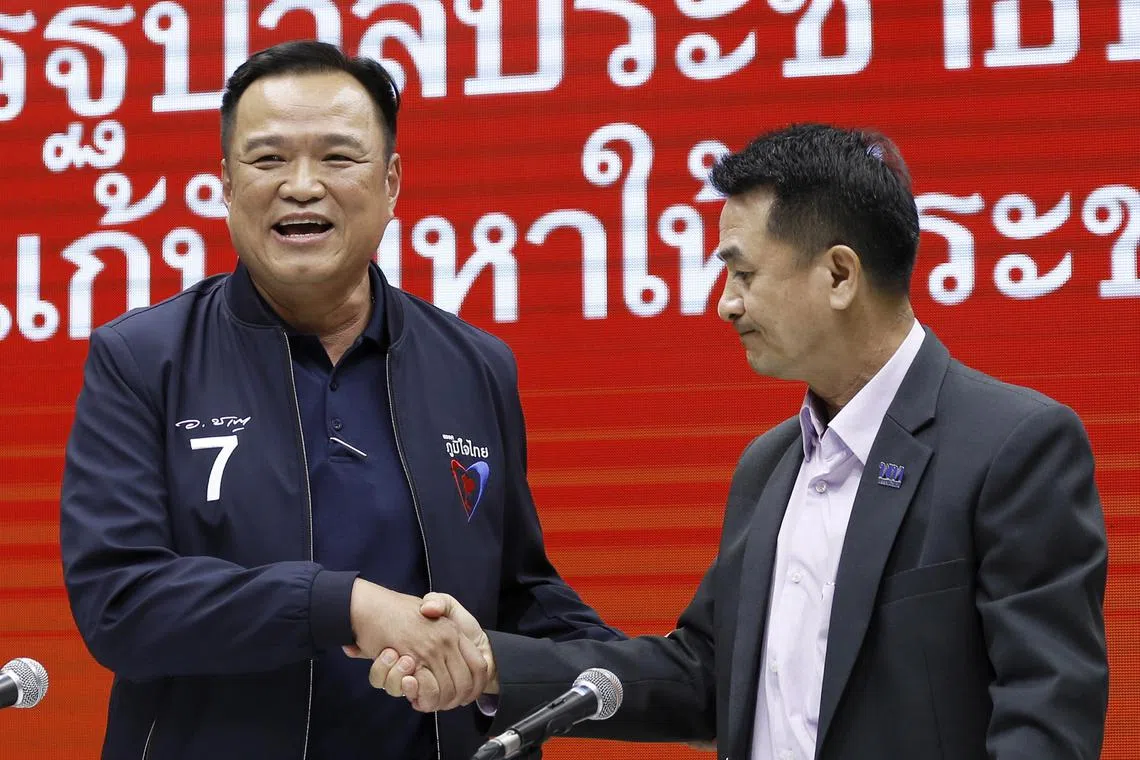Pheu Thai brings more parties into its fold in bid to form next government
Sign up now: Get insights on Asia's fast-moving developments

Bhumjaithai Party leader Anutin Charnvirakul (left) and Pheu Thai Party leader Cholnan Srikaew after forming a coalition government on Aug 7.
PHOTO: EPA-EFE
BANGKOK - The Pheu Thai Party, backed by former premier Thaksin Shinawatra, is bringing more partners into its coalition the May 14 election.
Six junior parties will join the alliance established earlier this week by second- and third-place election winners, Pheu Thai (141) and Bhumjaithai Party (71), said Pheu Thai leader Cholnan Srikaew at a press conference on Wednesday.
The six parties have 16 seats in total, raising the total number of coalition MPs to 228.
This is still short of a simple majority in the 500-member Lower House, as Pheu Thai continues to drum up support in anticipation of the upcoming parliamentary sitting where lawmakers will vote for Thailand’s next prime minister.
The new parties joining the coalition are Prachachat, Seri Ruam Thai, Plung Sungkom Mai, Party of Thai Counties, Pue Thai Rumphlang and Chartpattana Kla. The Pheu Thai-led bloc initially had 212 members.
Mr Cholnan said Pheu Thai believes it will be able to break the stalemate, and has asked for cooperation from all lawmakers to elect its PM candidate, real estate mogul Srettha Thavisin, 60, during the vote.
“The sooner we can establish a government, the faster we will be able to solve the problem,” said Mr Cholnan, emphasising the need to end political polarisation so the country can move forward.
The Bhumjaithai Party which leads ministries in the outgoing administration, is most well known for its pro-cannabis policies that led to the nationwide decriminalisation of the substance, but the policies have become a divisive topic due to what critics say is ambiguous regulation of the weed-related products.
Pheu Thai began courting conservative parties – some from the outgoing military-linked government – after it parted ways with the reformist Move Forward Party (MFP), which was its main partner in the former alliance of non-military parties. Pheu Thai had dropped the MFP from its plans to form a government after facing strong resistance from conservative and military-linked lawmakers whom it will need on its side to successfully nominate Mr Srettha for the job.
This has relegated the MFP to the opposition camp.
Most of the new parties joining the Pheu Thai coalition on Wednesday were previously part of the alliance that included the MFP. More parties and individual MPs could join the coalition in the coming days, said Pheu Thai leaders.
Under the Constitution, a prime minister candidate needs 376 votes from a joint sitting of Parliament’s 500 elected MPs and the 250-member junta-elected Senate to get the job.
This means that the Pheu Thai coalition will still have to garner support from MFP MPs or lawmakers from the conservative or military-linked factions.
These factions include the junta-elected senators or parties that are part of the outgoing military-linked government, such as Palang Pracharath and United Thai Nation Party, who are associated with former army chiefs, caretaker deputy prime minister Prawit Wongsuwan and caretaker PM Prayut Chan-o-cha, respectively.
The vote is expected to take place after Aug 16, pending a court decision over a petition related to MFP leader Pita Limjaroenrat’s re-nomination for premier.
Despite winning the May 14 election with 151 Lower House seats, the MFP was unable to form the government,
On July 13, Mr Pita failed to garner enough support from lawmakers in his first attempt to secure the votes needed to become prime minister.
A week later, the 42-year-old was denied a second try
The Constitutional Court said it needed to review a petition it received that challenged Parliament’s decision to deny Mr Pita a second attempt at being nominated, and it will consider the case on Aug 16.
With the political stalemate still ongoing, Thaksin – who has been in self-exile overseas for 15 years to avoid criminal charges he says are politically motivated – has also delayed his plan to return to Thailand, which was originally scheduled for Aug 10.



